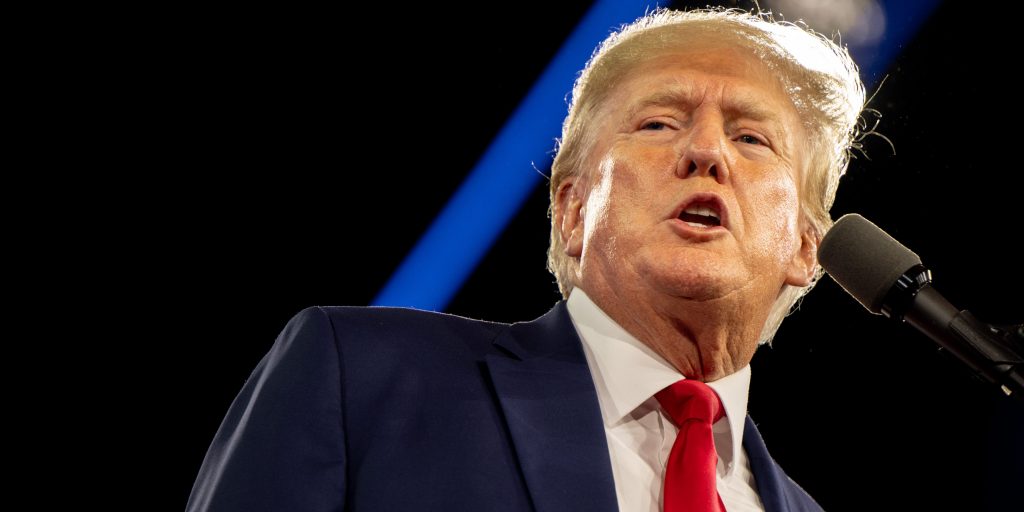- A Trump-appointed judge was unclear on a number of key issues related to his lawsuit over the Mar-a-Lago search.
- Judge Aileen Cannon ordered Trump's lawyers to elaborate by Friday on the "precise relief" they seek.
- Legal experts previously panned Trump's lawsuit and said it lacked fundamental elements.
A day after Donald Trump sued to stop the Justice Department from reviewing records seized at Mar-a-Lago, a federal judge appeared to join other legal experts in their bafflement over what specifically Trump was looking for.
Trump's lawsuit was widely scorned by former federal prosecutors and other legal scholars, who said the filing was lacking fundamental elements, such as exhibits, sworn affidavits, or a viewpoint on how a judge should approach the issues raised.
In interviews and on social media, legal experts said the lawsuit was more akin to a press release with the way it aired Trump's grievances against the Justice Department and described the former president as the "clear frontrunner" in the 2024 Republican primary.
On Tuesday, Judge Aileen Cannon, who was appointed to the bench by Trump and confirmed in 2020, seemed equally unsure of what to make of his lawsuit. Cannon asked the former president's lawyers to further explain what they wanted and how they believed the court should approach their request.
The judge ordered Trump's lawyers to respond by Friday with a court filing "further elaborating" on several points, including the "asserted basis for the exercise of this court's jurisdiction," "the framework applicable to the exercise of such jurisdiction," and the precise relief they want.
Cannon also asked Trump's legal team to address "the effect, if any," of a separate proceeding before Magistrate Judge Bruce E. Reinhart, who approved the warrant allowing the FBI to search the former president's South Florida estate.
Shortly after Cannon requested the additional briefing, legal experts pointed to her initial response as an ominous sign for Trump's lawsuit.
"It's never a good sign when within 24 hours of filing a motion a friendly judge issues an order demanding you submit more information on why exactly you brought the matter to her in the first place," wrote Bradley Moss, a national security lawyer.
In his lawsuit Monday, Trump urged Cannon to appoint a third party — known as a "special master" — to review records seized from Mar-a-Lago to determine whether any are covered by attorney-client privilege, executive privilege, or similar legal doctrines. Until then, Trump's lawyers argued, the judge should forbid the Justice Department from reviewing materials removed from the former president's Mar-a-Lago club.
Trump's lawyers also demanded a more detailed inventory of the items seized during the August 8 search. A manifest of those items, publicly released days after the search, revealed that FBI agents seized more than a dozen boxes of government records from Mar-a-Lago, some of which contained classified and top secret material.
The FBI also seized binders of photos, a handwritten note, and the executive grant of clemency for Trump's longtime ally Roger Stone.
Trump's lawsuit, coming two weeks after the FBI searched Mar-a-Lago, marked his first legal filing to date related to the raid. In the 27-page lawsuit, Trump called the search "unprecedented and unnecessary" and alleged that it was motivated by politics.
Later Monday evening, the conservative columnist John Solomon published a May 10 letter from the National Archives revealing that it found more than 700 pages of classified material in 15 boxes of government records that Trump turned over in January.
"In its initial review of materials within those boxes, NARA identified items marked as classified national security information, up to the level of Top Secret and including Sensitive Compartmented Information and Special Access Program materials," Debra Wall, the US's national archivist, wrote in the letter.
Those 700 pages were in addition to records that the Justice Department recovered after it subpoenaed Trump in May and searched Mar-a-Lago this month.
According to The New York Times, the National Archives spent most of 2021 trying to recover government records from Trump in accordance with the Presidential Records Act. But Trump resisted calls to return the materials, describing them as "mine."
The Justice Department launched a criminal investigation into Trump's handling of national security information earlier this year. According to the unsealed FBI warrant authorizing the Mar-a-Lago search, prosecutors are scrutinizing if Trump violated three federal laws, including the Espionage Act, by moving and refusing to return government records to the National Archives after leaving office.
One lawyer familiar with the Trump team's thought process told Insider last week that the investigation is a significant legal risk to the former president.
"The classified-documents case is an easy one," the lawyer said. "It's open and shut. He took an administrative issue and turned it into a full-blown criminal case."
